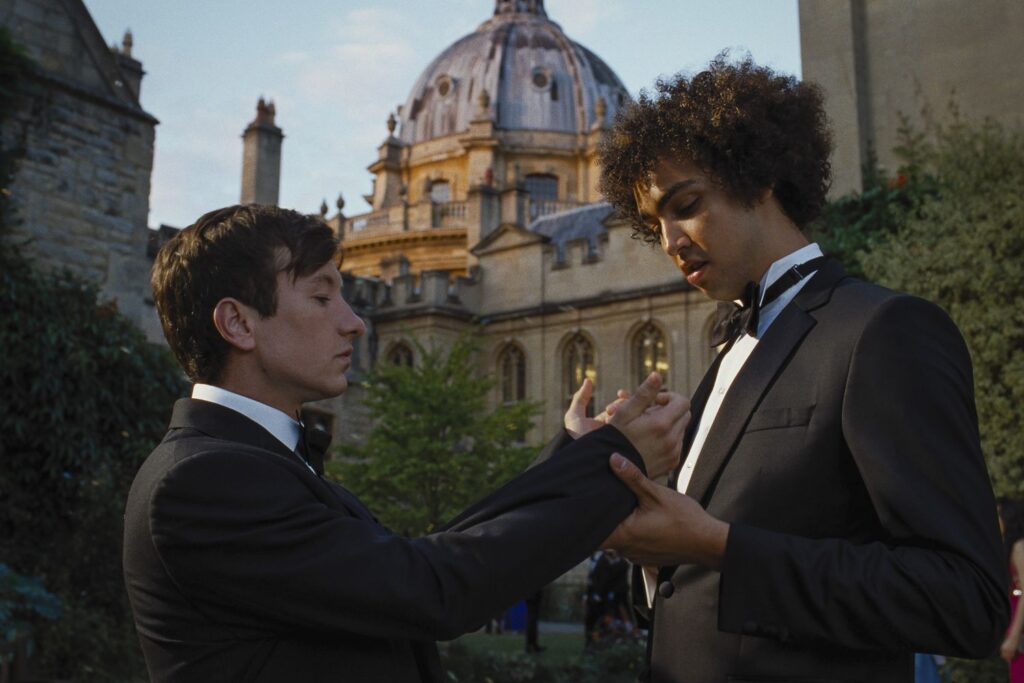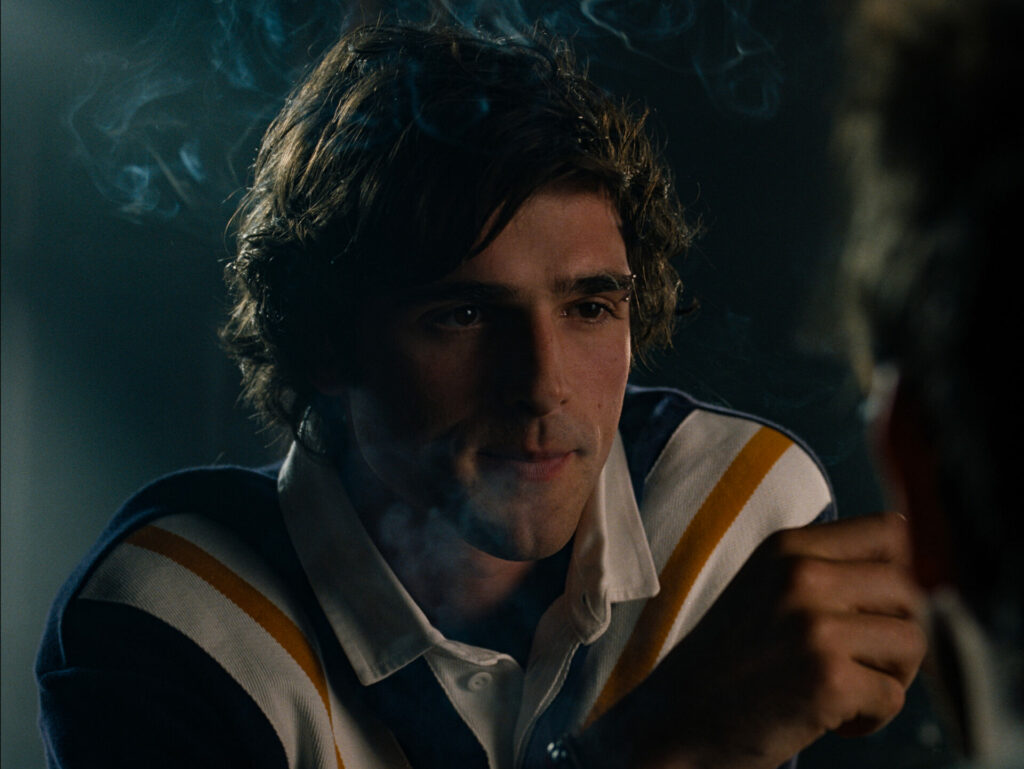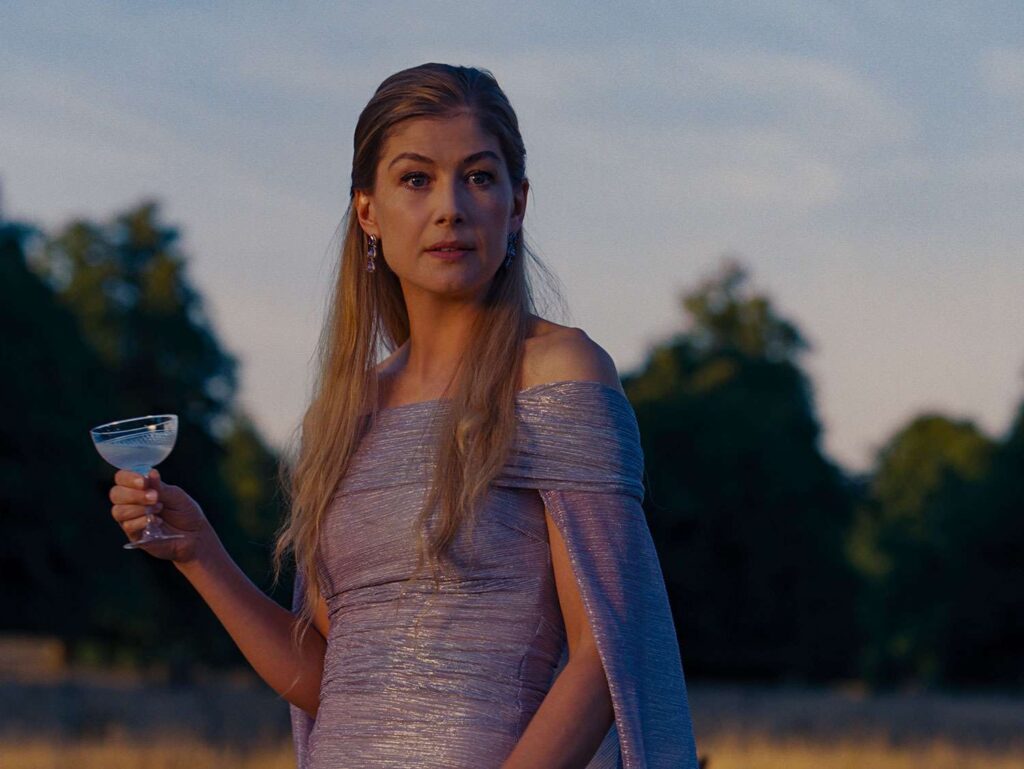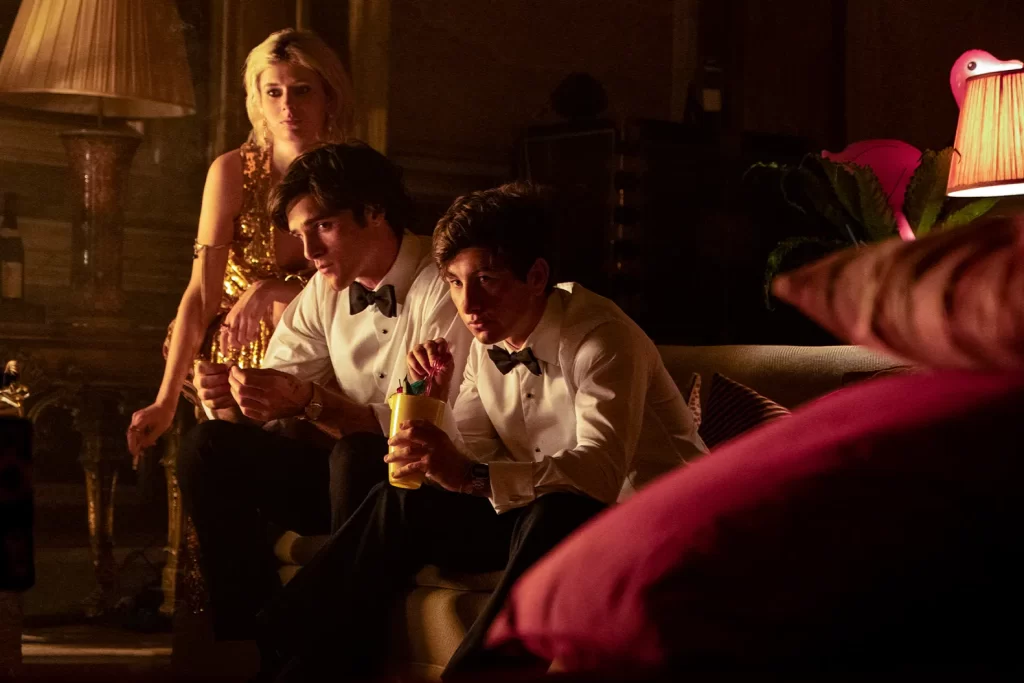
“Eat the rich” is generally meant as a metaphor, but in Saltburn, the new psychodrama from Emerald Fennell, it verges on becoming literal. Midway through the movie, during one of the many pivot points in its kinked narrative, a young man coos that he intends to devour his female quarry before burying his face between her legs. Shortly thereafter, we see him sinking into a bathtub, blood dripping down his chin, like a vampire crawling into his coffin after a fresh kill.
This is among the movie’s plentiful striking images that are designed to induce a gasp of horror or a shudder of pleasure. Saltburn’s plot may traffic in ghastly occurrences—deception, suicide, murder, undercooked eggs—but it primarily operates as a work of provocation. If you find yourself clucking your tongue at its tactlessness or wincing at its indecency, you are simply playing your part as the appalled observer. To paraphrase a popular line that tends to circulate on social media, the obscenity is the point.
Speaking of social media, our modern vocabulary has developed a word for this sort of instigative behavior: trolling. Online, such inflammatory rhetoric tends to be best ignored, deprived of the digital oxygen it needs to survive, but Saltburn can’t be so easily dismissed. That’s because Fennell, in addition to fashioning herself as an agitator, is also establishing herself as a damn good filmmaker. Her debut feature, Promising Young Woman, pulsed with electricity and color, shaking you so forcefully with its energy and craft that you barely noticed the flimsiness of its underlying premise. Saltburn is less canny in its stealth, but just as you can’t miss its absurdity, you cannot deny its vitality. This isn’t just trolling; it’s extremely well-made trolling.

Fennell’s disdain for subtlety affords her the latitude to deliver information quickly and effectively. So when young Oliver (Barry Keoghan) arrives at Oxford on a scholarship in 2006, it takes all of 90 seconds—a few whispered insults, some patronizing glances—before we appreciate that he feels like an outsider, a impoverished interloper flailing to fit in among the snobby elites. That ruling class is personified by Felix (Jacob Elordi, playing a different kind of celebrity than he just did in Priscilla), a swaggering ladies’ man—during one funny moment at a frat party, he casually plucks a female student from the couch, leaving the hapless schmuck who’d spent the past hour chatting her up in disbelief—who wears his privilege like a second skin.
The casting here is so spot-on, it’s practically criminal. Elordi, an Australian trading his faux American accent from Euphoria for a more posh British one, is the spitting image of careless charisma and innate desirability; when he laments that “It’s so fucking hot!” the camera lingers over his shirtless abdomen, suggesting the script is talking about more than just the weather. Keoghan, by contrast, is a natural-born creep—spotting Oliver in a rented tuxedo, a classmate observes that he’s starting to pass as “a real human boy”—and his unnerving intensity swirls around Elordi’s radiant luster like, as another character finely puts it, a moth to flame.

It is difficult to imagine Oliver and Felix occupying the same social universe, much less becoming friends. Yet once the poor boy does the rich lad a good deed, they start growing closer, and the cagiest part of Fennell’s screenplay is how deftly it sketches in the contours of their tightening relationship, leaving room for ambiguity. Does Felix genuinely like Oliver, or is he just dabbling in a bit of charity and virtue-signaling? As for Oliver, is he a decent soul longing for human connection, or a parasite all too eager to latch onto a generous and unsuspecting host? The actors nimbly heighten this uncertainty; Elordi plays Felix less as arrogant than involuntarily superior, while Keoghan obscures Oliver’s true intentions, rendering him simultaneously sympathetic and ominous.
It takes a bit of time before Fennell definitively resolves this haziness, and in the interval—specifically, once Felix graciously invites Oliver to spend the summer at his titular estate—Saltburn grows increasingly angular and perverse. As Oliver learns to navigate Felix’s family—including his somewhat kooky parents (played by Rosamund Pike and Richard E. Grant), his capricious sister (Alison Oliver, from Conversations with Friends), and his spiteful cousin (Gran Turismo’s Archie Madekwe)—he becomes less a fish out of water than a social climber, gradually ascending the ladder from his rumpled origins to a newfound entitlement. This results in some bizarre conversations—including one with a visiting friend (look, it’s Carey Mulligan!) that improbably touches on the Russian word for “whore”—that don’t quite resemble real life, but which nonetheless amplify the movie’s simmering tension.

And Fennell is plenty good at that. It’s tricky to classify Saltburn as a matter of genre—it’s part dark comedy, part psychological thriller, part class satire—but it is indisputably a piece of glitzy showmanship. Working with the great cinematographer Linus Sandgren (La La Land), Fennell conjures an eerie, ethereal world that is somehow both decadent and decayed. I don’t know that she needed to shoot in the Academy aspect ratio, but she still frames her English castle as a towering monument of excess—she even has the gall to throw in a hedge maze, à la The Shining—even as she imbues it with a sinister aura, like a breathing mausoleum. She also makes brilliant use of color, mixing in neon reds and blues along with dusky greys; a shot of Oliver descending an outdoor staircase, moonlight piercing through the surrounding shadows, is breathtaking in its beauty, even as it also carries complex implications for the character.
Is Oliver in love with Felix? He asks himself the same question, in a curious framing device where he refers to his companion in the past tense, and which seems to reflect one side of a police interview. The answer is expectedly complicated, even if it is also beside the point. Saltburn proves itself a portrait of obsession—a thirst so all-consuming that it doesn’t much matter whether Oliver wants to fuck Felix, be him, or eat him. (At one point, he greedily consumes some of Felix’s leftover bodily fluids, and remember what I was saying about provocation?)
The sheer forcefulness of this dynamic, and of Fennell’s bold technique in general, is engaging, but it can also be diminishing. Roughly 90 minutes into Saltburn, Felix takes Oliver on a surprise journey to a secret destination. When they arrive, what they (and we) discover essentially brings the movie’s dramatic and thematic arcs to a close. Yet Fennell keeps going, delivering a protracted third act that focuses less on character progression than shock value.

The result is less explosive than she seems to have imagined. In keeping with her mischievous ethos, she has loaded the story with drastic developments and outré flourishes—a sequence in a cemetery is particularly grotesque—but her putative audacity is oddly predictable and mundane. I am not congratulating myself for anticipating Saltburn’s twists and turns (I was certainly surprised by a few of them) so much as I’m criticizing its false sense of astonishment. Fennell is good with pop-music cues, but after awhile, all of the piled-on outrageousness just feels like noise.
At the same time, the movie’s willingness to go to extremes—to forgo emotional realism in favor of exaggerated melodrama—lends it a demented integrity. It’s unclear whether such brazen behavior is courageous or shameless, and I’m sure Fennell thinks there’s no difference. Who’s to say she’s wrong? Saltburn is too ludicrous a picture to be taken seriously, but that doesn’t make it trifling; it may be mere trolling, but it commits to its artifice with style and gusto. Ultimately, the only thing disturbing about it is that it’s so effortlessly watchable. We are all just moths, drawn helplessly toward its glittering, infantile flame.
Grade: B
Jeremy Beck is the editor-in-chief of MovieManifesto. He watches more movies and television than he probably should.
